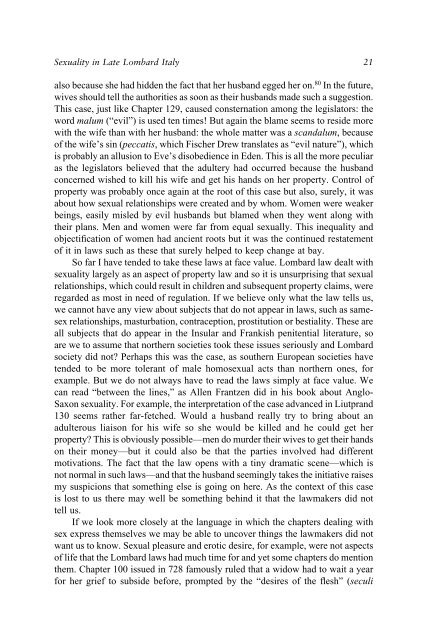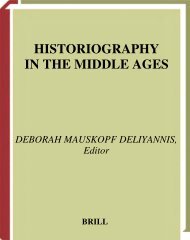Medieval Sexuality: A Casebook - Julian Emperor
Medieval Sexuality: A Casebook - Julian Emperor
Medieval Sexuality: A Casebook - Julian Emperor
Create successful ePaper yourself
Turn your PDF publications into a flip-book with our unique Google optimized e-Paper software.
<strong>Sexuality</strong> in Late Lombard Italy 2111112342225672228910111232224567892022212345678930111123435678940111123222also because she had hidden the fact that her husband egged her on. 80 In the future,wives should tell the authorities as soon as their husbands made such a suggestion.This case, just like Chapter 129, caused consternation among the legislators: theword malum (“evil”) is used ten times! But again the blame seems to reside morewith the wife than with her husband: the whole matter was a scandalum, becauseof the wife’s sin (peccatis, which Fischer Drew translates as “evil nature”), whichis probably an allusion to Eve’s disobedience in Eden. This is all the more peculiaras the legislators believed that the adultery had occurred because the husbandconcerned wished to kill his wife and get his hands on her property. Control ofproperty was probably once again at the root of this case but also, surely, it wasabout how sexual relationships were created and by whom. Women were weakerbeings, easily misled by evil husbands but blamed when they went along withtheir plans. Men and women were far from equal sexually. This inequality andobjectification of women had ancient roots but it was the continued restatementof it in laws such as these that surely helped to keep change at bay.So far I have tended to take these laws at face value. Lombard law dealt withsexuality largely as an aspect of property law and so it is unsurprising that sexualrelationships, which could result in children and subsequent property claims, wereregarded as most in need of regulation. If we believe only what the law tells us,we cannot have any view about subjects that do not appear in laws, such as samesexrelationships, masturbation, contraception, prostitution or bestiality. These areall subjects that do appear in the Insular and Frankish penitential literature, soare we to assume that northern societies took these issues seriously and Lombardsociety did not? Perhaps this was the case, as southern European societies havetended to be more tolerant of male homosexual acts than northern ones, forexample. But we do not always have to read the laws simply at face value. Wecan read “between the lines,” as Allen Frantzen did in his book about Anglo-Saxon sexuality. For example, the interpretation of the case advanced in Liutprand130 seems rather far-fetched. Would a husband really try to bring about anadulterous liaison for his wife so she would be killed and he could get herproperty? This is obviously possible—men do murder their wives to get their handson their money—but it could also be that the parties involved had differentmotivations. The fact that the law opens with a tiny dramatic scene—which isnot normal in such laws—and that the husband seemingly takes the initiative raisesmy suspicions that something else is going on here. As the context of this caseis lost to us there may well be something behind it that the lawmakers did nottell us.If we look more closely at the language in which the chapters dealing withsex express themselves we may be able to uncover things the lawmakers did notwant us to know. Sexual pleasure and erotic desire, for example, were not aspectsof life that the Lombard laws had much time for and yet some chapters do mentionthem. Chapter 100 issued in 728 famously ruled that a widow had to wait a yearfor her grief to subside before, prompted by the “desires of the flesh” (seculi













